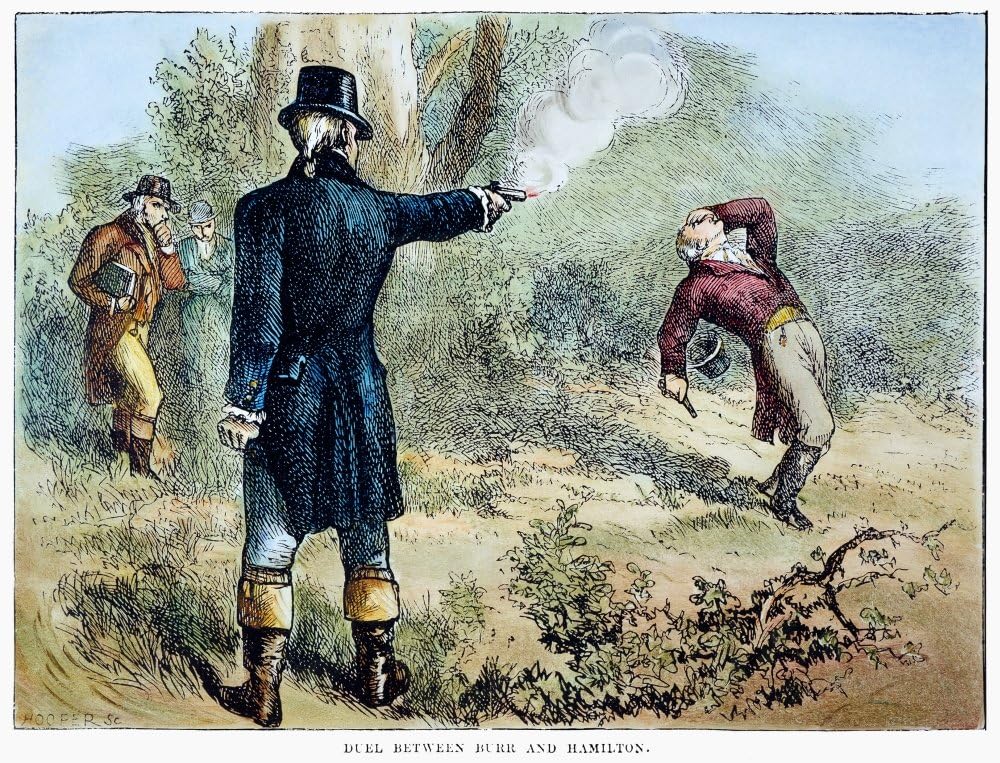The duel between Alexander Hamilton and Aaron Burr on July 11, 1804, remains one of the most infamous events in American political history. It was not just a deadly personal conflict but also a stark reflection of the political turbulence and factionalism that characterized the early years of the republic. The duel, which resulted in Hamilton’s death and the effective end of Burr’s political career, symbolized the dangers of partisan politics, personal ambition, and the fragile nature of democracy in its infancy.

The Political and Personal Rivalry
The animosity between Hamilton and Burr had deep roots in both personal and political matters. As a prominent Federalist and former Secretary of the Treasury, Hamilton was a fierce proponent of a strong central government. Burr, on the other hand, represented the Democratic-Republican viewpoint, which favored states’ rights and a more decentralized government (Chernow, Alexander Hamilton, 2004). Their rivalry was further complicated by personal disagreements, including Hamilton’s vocal opposition to Burr’s political aspirations, particularly during the 1800 presidential election when Burr sought to be elected over Thomas Jefferson through a deadlocked electoral process (Freeman, Affairs of Honor, 2001).
Hamilton’s open criticism of Burr, most notably during Burr’s 1804 New York gubernatorial run, further escalated tensions. When Hamilton allegedly made disparaging remarks about Burr’s character, it was the final straw that led Burr to challenge Hamilton to a duel (Ellis, Founding Brothers, 2000). Burr believed that defending his honor was essential, especially given the importance of reputation in the highly charged political atmosphere of the early 19th century.
The Duel as a Symbol of Political Tensions
The duel can be seen as a manifestation of the broader political divisions in the United States at the time. The Federalists, represented by Hamilton, and the Democratic-Republicans, led by Jefferson and Burr, were locked in fierce ideological battles over the future direction of the country (Isenberg, Fallen Founder, 2007). The Hamilton-Burr feud epitomized the personal nature of political rivalries in an era when the American political system was still developing. Political discourse often descended into bitter personal attacks, as seen in Hamilton and Burr’s case, where political differences became intertwined with personal vendettas (Freeman, Affairs of Honor, 2001).
Moreover, the duel highlighted the precarious state of democracy during this period. The practice of dueling, while illegal in some states, was still seen by many as an acceptable means of resolving personal grievances (Ellis, Founding Brothers, 2000). The fact that two of the most prominent politicians in the country could engage in a deadly duel reflects the fragile balance between democratic institutions and the personal ambitions of political leaders. In many ways, the duel underscored the need for more stable and codified mechanisms for resolving political disputes (Chernow, Alexander Hamilton, 2004).
The Aftermath and Legacy
The duel had profound consequences for both men and the political landscape of the United States. Hamilton’s death was a major blow to the Federalist Party, which never fully recovered (Chernow, Alexander Hamilton, 2004). Burr, though acquitted of murder charges, saw his political career effectively destroyed. His subsequent involvement in a controversial scheme to potentially establish an independent nation in the Western territories only further alienated him from mainstream politics, and he spent much of the rest of his life in obscurity (Isenberg, Fallen Founder, 2007).
On a broader level, the Hamilton-Burr duel became a cautionary tale about the dangers of unchecked political ambition and personal vendettas. It marked a turning point in American politics, where the violent and personal nature of political conflicts began to give way to more structured and institutionalized forms of governance (Freeman, Affairs of Honor, 2001). The duel, as a symbolic event, underscored the need for a more civil and stable political culture, one in which disputes would be resolved through democratic institutions rather than through violence (Ellis, Founding Brothers, 2000).
In the end, the Hamilton-Burr duel stands as a powerful reminder of the fragility of early American democracy and the dangers of allowing personal rivalries to dominate the political arena. It is a lesson that continues to resonate today, as political factions and personal ambitions still threaten the stability of democratic institutions.
References
- Freeman, Joanne B. Affairs of Honor: National Politics in the New Republic. New Haven: Yale University Press, 2001.
- Chernow, Ron. Alexander Hamilton. New York: Penguin Press, 2004.
- Isenberg, Nancy. Fallen Founder: The Life of Aaron Burr. New York: Viking, 2007.
- Ellis, Joseph J. Founding Brothers: The Revolutionary Generation. New York: Alfred A. Knopf, 2000.